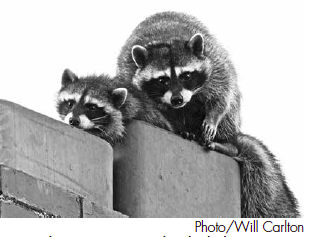The raccoons must be on the prowl again in the neighborhood and nearby areas, as indicated by a multitude of NextDoor posts. A neighbor north of the freeway was able to capture some photos on his “raccoon cam” and shared them on NextDoor, stirring much discussion.
Raccoons have supporters who think they are cute and should be protected, as they were in this part of the state before it became an urban community.
Other neighbors reported raccoons killing chickens, a pet rabbit and koi fish in their ponds. Several reported significant damage by these critters in attics and basements. Prevention includes sealing up all potential home access points with heavy-duty screening material. Other recommendations for control include not leaving pet food outside at night and securing garbage lids.

Raccoons carry disease that can spread to other animals and possibly humans. Connie Fanos of Marshall Way posted, “They ubiquitously carry a disease called raccoon roundworm (baylisascaris procyonis), which is very often fatal in humans. It is found in 70 percent of adults and 90 percent of juvenile raccoons.” Later she added, “Infection of the eyes may result in permanent visual damage and loss.” This fact was mostly confirmed by the Centers for Disease Control and Prevention, which reported on its web site, “Human infections are rare but can be severe if the parasites invade the eye.”
The roundworm is carried in the intestines of raccoons and is spread to other animals or people through feces. If raccoon feces are encountered in your yard, be very cautious when cleaning. Use rubber gloves and masks to avoid any contact with the microscopic worm eggs. Soak the area with boiling water to kill the worm eggs. Thorough hand cleaning is also important to prevent infection.
Plastic recycling
Yogurt cups, ketchup bottles, and plastic takeout containers may again be placed in the blue recycling containers rather than trash cans, the Sacramento Recycling and Solid Waste Division announced on NextDoor.
“This past June, due to severe market shifts in recycling, the city instructed residents that many plastic items were not being accepted by the city’s recycling processor, Waste Management,” the post said.
Somewhere on the plastic container is a number, ranging from 1 to 7, inside of the recycling symbol (a triangle with arrows). According to the city, “The lower the number, the easier it is to re-purpose the type of plastic into another product. All plastics with numbers 1 to 7 can now be recycled in Sacramento.”
Visit the Waste Wizard at http://sacrecycle.org to see if an item is recyclable. Plastic bags and Styrofoam egg cartons are not recyclable.